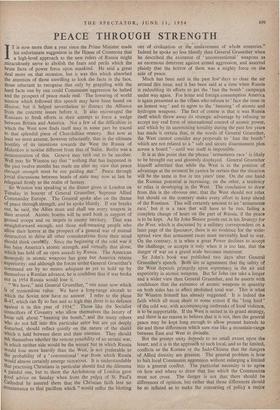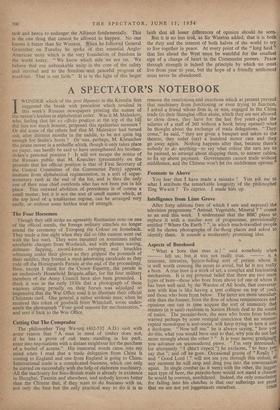PEACE THROUGH STRENGTH I T is now more than a year
since the Prime Minister made his unfortunate suggestion in the House of Commons that a high-level approach to the new rulers of Russia might miraculously serve to abolish the fears and perils which the brute facts of power force upon mankind. He said a great deal more on that occasion, but it was this which absorbed the attention of those unwilling to look the facts in the face, those reluctant to recognise that only by grappling with the hard facts one by one could Communist aggression be halted and the prospect of peace made real. The lowering of world tension which followed this speech may have been based on illusion, but it helped nevertheless to distract the Alliance from the concrete issues before it. It also encouraged the Russians to fresh efforts in their attempt to force a wedge between Britain and America. Not a few of the difficulties in Which the West now finds itself may in some part be traced to that splendid piece of Churchillian oratory. But now at least we must assume, however reluctantly, that in the ultimate hostility of its ,intentions towards the West the Russia of Malenkov is nowise different from that of Stalin. Berlin was a demonstration of this. Geneva may turn out to be another. Well may Sir Winston say that "nothing that has happened in the past twelve months has made me alter my view that peace through strength must be our guiding star." Peace through Jovial discussions between heads of state may now at last be relegated firmly to the realm of fantasy.
Sir Winston was speaking at the dinner given in London on Tuesday in honour of General Gruenther, Supreme Allied Commander Europe. The General spoke also on the theme of peace through strength, and he spoke bluntly. If war breaks out, he said, the Allies must and shall use every weapon in their arsenal. Atomic bombs will be used both in support of ground troops and on targets in enemy territory. That was straightforward enough, and those well-meaning people who allow their horror at the prospect of a general war of mutual destruction to drive all other considerations from their mind Should think carefelly. Since the beginning of the cold war it has been America's atomic strength, and virtually that alone, Which has held off an open assault by Russia. The American monopoly in atomic weapons has gone but America retains superiority; and although the forces under General Gruenther's command are by no means adequate as yet to hold up by themselves a Rusian advance, he is confident that if war broke out in 1954 Russia would lose it.
"We have," said General Gruenther, "one asset now which Is of tremendous value. We have a long-range aircraft to Which the Soviet now have no answer. I refer to the plane 13-47, which can fly so fast and so high that there is no defence against it in this year of 1954." Those like the Socialist councillors of Coventry who allow themselves the luxury of loose talk about "banning the bomb," and the many others Who do not. fall into this particular error but are yet deeply disturbed, should reflect. quietly on the nature of the shield Which is held between them and their enemies. They should ask themselves whether the remote possibility of an atomic war, 111 which neither side would be the winner but in which Russia Would lose more heavily than the West, is not preferable to the probability of a ' conventional ' war from which Russia Would almost certainly emerge victorious. It is understandable that practising Christians in particular should find the dilemma a painful one, but to them the Archdeacon of London gave good advice on Sunday when from the pulpit of St. Paul's Cathedral he assured them that the Christian faith lent no Neountenance to that pacifism which "would suffer the blotting out of civilisation or the enslavement of whole countries." Indeed he spoke no less bluntly than General 'Gruenther when he described the existence of unconventional ' weapons as an enormous deterrent against armed aggression, and asserted plainly that the horror of them was a mighty force on the side of peace.
Much has been said in the past feW* days to clear the air around this issue, and it has been said at a time when Russia is redoubling its efforts to get the 'ban the bomb' campaign under way again. For home and foreign consumption America is again presented as the villain who refuses to face the issue in an honest way' and to agree to the 'banning' of atomic and hydrogen weapons. The fact of course is that it was Russia itself which threw away its strategic advantage by refusing to accept any real form of international control of atomic power, and which by its unremitting hostility during the past few years has made it certain that, in the words of General Gruenther, the West cannot consider any proposals to ban the bomb' which are not related to a "safe and secure disarmament plan across a board "—until war itself is impossible.
It is at this point that the phrase armaments race' is likely to be brought out and gloomily displayed. General Gruenther himself admitted that while the West is in the position of advantage at the moment he cannot be certain that the situation will be the same in five or ten years' time. On the one hand the Russian potential is increasing; on the other, a tendency to relax is developing in the West. The conclusion to draw from this is the obvious one; that the West should not relax but should on the contrary make every effort to keep ahead of the Russians. This will certainly amount to an armaments race,' but it is a race that will have to be run, failing a complete change of heart on the part of Russia, if the peace is to be kept. As Sir John Slessor points out in his Strategy for the West, which is discussed by a military correspondent on a later page of the Spectator, there is no evidence for the wide- spread view that armament races must inevitably lead to war. On the contrary, it is when a great Power declines to accept the challenge, or accepts it only when it is too late, that the danger of war on a grand scale becomes imminent.
Sir John's book was published two days after General Gruenther's speech. Both are in agreement that the safety of the West depends primarily upon supremacy in the air and superiority in atomic weapons. But Sir John can take a longer and a wider view than General Gruenther, and he asserts with confidence that the existence of atomic weapons in quantity on both sides has in effect abolished total war. This is what Sir Winston himself has already suggested. It is indeed the faith which all must share to some extent if the 'long haul' of the cold war, with accompanying outbreaks of local violence, is to be supportable. If the West is united in its grand strategy, and there is no reason to believe that it is not, then the general peace may be kept long enough to allow present hatreds to die and those differences which now rise like a mountain-range between East and West to dwindle.
But the greater unity depends to no small extent upon the lesser, and it is in the approach to such local, and so far limited, conflicts as the Korean or the Indo-Chinese that the dangers of Allied disunity are greatest. The general problem is how to halt local Communist aggression without enlarging a limited into a general conflict. The particular necessity is to agree on how and where to draw that line which the Communists must not cross. The danger is not that there should be differences of opinion, but rather that those differences should be so inflated as to make the concerting of policy a major task and hence to endanger the Alliance fundamentally. This is the one thing that cannot be allowed to happen. No one knows it better than Sir Winston. When he followed General Grucnther on Tuesday he spoke of that 'essential Anglo- American unity which is the very foundation of freedom in the world today. "We know which side we are on. We believe that our unbreakable unity is the core of the safety and survival and to the freedom and peaceful progress of mankind. That is our faith." It is in the light of this larger faith that all lesser differences of opinion should be seen.
But it is no less tru6, as Sir Winston added, that it is both the duty and the interest of both halves of the world to try to live together in peace. At every point of the "long haul" that lies ahead the West must be watchful for the smallest sign of a change of heart in the Communist powers. Peace through strength is indeed the principle by which we must live from year to year, but the hope of a friendly settlement must never be abandoned.



































 Previous page
Previous page